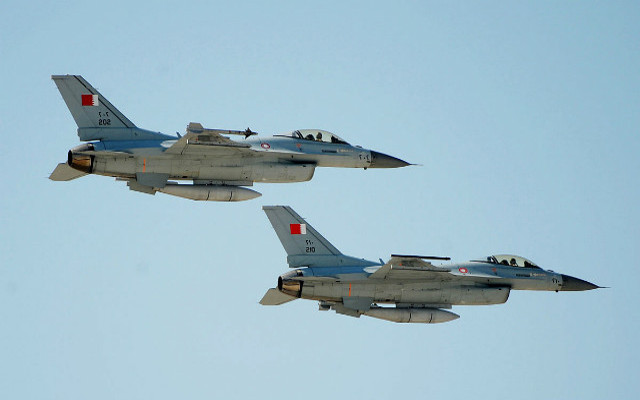
12 September 2017 – On Friday, 8 September 2017, the United States (US) Department of State notified potential foreign military sales (FMS) to the Government of Bahrain totaling approximately $3.8 billion. The sales include 1) two 35-Meter Fast Patrol Boats at an estimated cost of $60.25 million; 2) 19 F-16V aircraft with support at an estimated cost of $2.785 billion; 3) TOW Missiles, equipment and support at an estimated cost of $27 million; and 4) the upgrade of F-16 Block 40 Aircraft to F-16V configuration at an estimated $1.082 billion. Americans for Democracy & Human Rights in Bahrain (ADHRB) strongly condemns the sale of military packages without human rights conditions to the Bahraini government and calls upon the US Congress to block the sale.
In March 2017, Secretary of State Rex Tillerson announced that the Trump Administration would be stripping human rights conditions from the sale of the F-16 combat aircraft, which were imposed under the Obama Administration when the sale was initially proposed. Several months later, however, in June 2017, Chairman of the Senate Foreign Relations Committee (SFRC) Senator Bob Corker (R-TN) sent a letter to Secretary Tillerson announcing he will provide no further clearances on arms sales to the Gulf Cooperation Council (GCC) states until the ongoing regional diplomatic crisis focused on Qatar is resolved. The letter suggested that the F-16 transfer may be held up, despite the general consensus shared by Senator Corker and the Administration that arms sales should not be limited by human rights; as summed up by Acting Assistant Secretary for the Bureau of Near East Affairs Stuart Jones, “the administration has de-linked…human rights from our security support.”
Nevertheless, during today’s nomination hearing for Justin Siberell as the new Ambassador to Bahrain, Senator Corker clarified that he will likely not block the F-16 sale, as it had been broached before the current GCC diplomatic dispute. It remains unclear whether the SFRC will move to block the other transfers announced on 8 September, such as the $60 million sale of two patrol boats, which do not appear to have been previously included in the F-16 deal.
The announcements of these sales come amid an intensified government campaign against civil society and peaceful political opposition in the kingdom, including the continued detention of leading human rights defenders Nabeel Rajab and Ebtisam al-Saegh, whom the State Department has called on the authorities to release. Increased repression of the majority Shia population has prompted both the State Department and the United Nations to condemn discrimination and call on the government to respect the right to free belief. During the release of the State Department’s 2016 International Religious Freedom report, Secretary Tillerson explicitly named Bahrain as a leading violator, criticizing the government for systematic and widespread discrimination against its majority Shia population. Additionally, the US Commission on International Religious Freedom (USCIRF) in April raised Bahrain to a Tier 2 violator of religious freedom rights for the first time, finding that “amidst an overall worsening of human rights conditions during the past year, religious freedom for the majority-Shi’a community deteriorated” against a backdrop of longstanding structural discrimination.
The Trump Administration’s decision to deepen unconditional cooperation with Bahrain – prominently signaled by the removal of rights restrictions on the F-16 sale – has an immediate negative impact on the kingdom’s human rights situation. In May 2017, the Bahraini security forces violently raided a peaceful sit-in protest that had been ongoing for almost one year in the town of Diraz, following the arbitrary citizenship revocation and judicial harassment of the country’s most prominent Shia cleric, Sheikh Isa Qassim. During the raid, the Bahraini security forces killed five individuals, injured hundreds, and arrested 286. The raid, which represents the deadliest day in Bahrain since before the 2011 pro-democracy protests, came just two days after President Trump met with Bahrain’s King Hamad bin Isa Al Khalifa. During their meeting, Trump told the king that there would be “no more strains” on the US-Bahrain relationship.
“The US government’s decision to greenlight a potential $3.8 billion arms transfer to Bahrain is disgraceful. Not only did the State Department strip the F-16 sale of its human rights conditions amid the kingdom’s worst crackdown in years, but now it has also further expanded the deal to include even more weapons and equipment,” said ADHRB Executive Director Husain Abdulla. “Earlier in 2017 the Trump Administration encouraged the Bahraini authorities to increase repression and disregard human rights; now it’s outright rewarding them for doing just that.”
ADHRB calls on Congress to block the sale of arms to the Government of Bahrain until such time as human rights conditions are re-imposed and the kingdom’s authorities have implemented substantive reforms. Moreover, if these sales are in fact confirmed, we call on the Department of Defense, the Department of State, and specifically the US Embassy in Manama to conduct extensive end-use monitoring to ensure that all weaponry is delivered to appropriately vetted units and that dual-purpose anti-personnel/anti-materiel weapons – like those included with the patrol boat package – are not able to be used against peaceful protesters or political targets. ADHRB reiterates its condemnation of the sale and notes that providing continued unconditional military assistance to a government that commits gross human rights violations will only undermine long-term stability and security.




